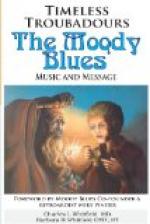de la Marche; she urged him to rise against the French
and induced her son, Henry III. of England, to support
him. Henry hoped to regain his hold of Poitou
and was further informed that the Count of Toulouse
and the Spanish kings would join the alliance.
There seems to have been a general belief that Jaime
would take the opportunity of avenging his father’s
death at Muret. However, no Spanish help was
forthcoming; the allies were defeated at Saintes and
at Taillebourg and this abortive rising ended in 1243.
Guillem de Montanhagol says in a
sirventes
upon this event, “If King Jaime, with whom we
have never broken faith, had kept the agreement which
is said to have been made [118] between him and
us, the French would certainly have had cause to grieve
and lament.” Bernard de Rovenhac shows greater
bitterness: “the king of Aragon is undoubtedly
well named Jacme (jac from jazer, to lie down) for
he is too fond of lying down and when anyone despoils
him of his land, he is so feeble that he does not
offer the least opposition.” Bernard Sicart
de Marvejols voices the grief of his class at the failure
of the rising: “In the day I am full of
wrath and in the night I sigh betwixt sleeping and
waking; wherever I turn, I hear the courteous people
crying humbly ‘Sire’ to the French.”
These outbursts do not seem to have roused Jaime to
any great animosity against the troubadour class.
Aimeric de Belenoi belauds him, Peire Cardenal is
said to have enjoyed his favour, and other minor troubadours
refer to him in flattering terms.
The greatest Spanish patron of the troubadours was
undoubtedly Alfonso X. of Castile (1254-1284).
El Sabio earned his title by reason of his enlightened
interest in matters intellectual; he was himself a
poet, procured the translation of many scientific
books and provided Castile with a famous code of laws.
The Italian troubadours Bonifaci Calvo and Bartolomeo
Zorzi were welcomed to his court, to which many others
came from Provence. One of his favourites was
the troubadour who was the last [119] representative
of the old school, Guiraut Riquier of Narbonne.
He was born between 1230 and 1235, when the Albigeois
crusade was practically over and when troubadour poetry
was dying, as much from its own inherent lack of vitality
as from the change of social and political environment
which the upheaval of the previous twenty years had
produced. Guiraut Riquier applied to a Northern
patron for protection, a proceeding unexampled in
troubadour history and the patron he selected was the
King of France himself. Neither Saint Louis nor
his wife were in the least likely to provide a market
for Guiraut’s wares and the Paris of that day
was by no means a centre of literary culture.
The troubadour, therefore, tried his fortune with
Alfonso X. whose liberality had become almost proverbial.
There he seems to have remained for some years and
to have been well content, in spite of occasional
friction with other suitors for the king’s favour.
His description of Catalonia is interesting.




